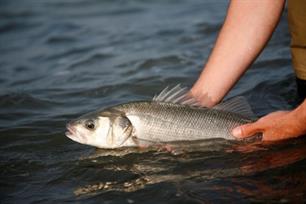2018 sea bass management measures
 In November, the Commission published its proposals for sea bass measures in 2018. In short, the Commission proposed that recreational fishers should not be allowed to keep any sea bass in 2018. The proposal even went so far as to suggest that recreational fishers should not be allowed to catch any bass the first half of the year, which is impossible to avoid or to enforce. Catch and release were proposed for the second half of the year. Some commercial fishing were allowed to continue. In effect the bass would be privatised, which would set a very dangerous precedent for the public’s access to the publicly-owned resource, fish.
In November, the Commission published its proposals for sea bass measures in 2018. In short, the Commission proposed that recreational fishers should not be allowed to keep any sea bass in 2018. The proposal even went so far as to suggest that recreational fishers should not be allowed to catch any bass the first half of the year, which is impossible to avoid or to enforce. Catch and release were proposed for the second half of the year. Some commercial fishing were allowed to continue. In effect the bass would be privatised, which would set a very dangerous precedent for the public’s access to the publicly-owned resource, fish.
In view of the Agriculture and Fisheries Council meeting 11th and 12th of December, the European Anglers Alliance (EAA) and the European Fishing Tackle Trade Association (EFTTA) sent the following letter, which includes a petition signed by more than 16,000 people, to the EU fisheries ministers to urge them to not make it illegal for members of the public to fish for bass recreationally and retain them:
Concerning sea bass 2018 management measures – recreational fisheries
We, the European Anglers Alliance and the European Fishing Tackle Trade Association launched a petition two weeks ago calling on the EU to not make it illegal for members of the public to fish for bass recreationally and retain them. Today, more than 16,000 people have signed to give their support to the plea, which you can read in the ANNEX below.
•We are asking you to support a roll-over of this year’s measures into 2018 with regard to recreational fishing for Northern bass. The 2017 measures we wish to see rolled over are: no retention in the first half of the year and a one fish per day bag limit for the second half of the year.
•For 2018, the Commission has proposed no fishing for bass by recreational fishers in the first half of the year – which is impossible to enforce – and no retention of bass in the second half of the year.
• The science behind the Commission’s proposal is pretty ‘novel’. Robust trend data is lacking for the bass fishery which has left much to such modelling and assumptions, which we believe don’t give an accurate picture of fishing mortality and the state of stock.
•New figures and modelling are under way from ICES. We believe this data will show that the state of the Northern bass stock is not as dire as currently assessed and that recreational fishing is not a threat to the stock. We believe some revised data will be available before Monday’s Council meeting, which will support this.
•For more than 20 years we have consistently said that the virtually unrestricted commercial fishing for bass should be controlled in order to avoid a situation exactly like the one we now find ourselves in. At no point were our claims taken seriously until three years ago when the EU was forced to intervene with emergency measures. The EU Commission is now proposing that members of the public fishing recreationally shall not be allowed to fish for or then keep a single bass in 2018. This is grossly unfair to hundreds of thousands of EU citizens fishing recreationally for publicly-owned bass.
•Furthermore, the Commission has proposed that some commercial fishing should be allowed to continue next year. We believe that access to fishing opportunities should be prioritised for recreational fishing by members of the public who will simply not understand why their fishing has been restricted while commercial fishing for bass continues under the current EU proposals.
•A week ago the Council and Parliament adopted the EU 2018 budget. In the budget 300,000 Euros are earmarked ‘Pilot project - Control scheme for recreational catches of sea bass’ (*). If anglers are not allowed to keep any of the bass caught, then there is no motivation for them to take part in this project, which is to trial an electronic log-book scheme. This would undermine the EU’s desire to collect better data on recreational catches.
The letter and the annex can be downloaded here.